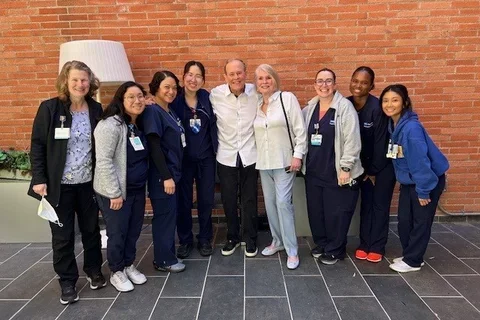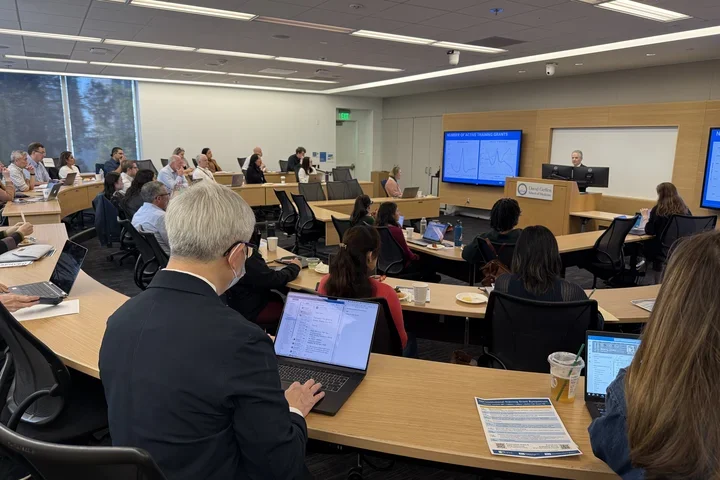"A Nurse's Laugh": Marsh Bull pens a poem about the hardworking nurses at UCLA CTRC
CTSI interviews CTRC patient, writer, and health advocate, Marsh Bull, on his ongoing treatment journey at UCLA

On April 8, 2021, C. Marsh Bull faced an unexpected and formidable challenge: he was diagnosed with prostate cancer. He had previously dealt with heart issues, lung disease, back surgeries, and five joint replacements, but not cancer. Entering this new challenge with the support of his wife and friends, Bull began the journey to understand how he could tackle what he calls “the uninvited intruder in my life.”
As a writer, he documented his experiences and challenges with his diagnosis, treatment and health. Before long, he faced a new trial: he received the news that he had myelodysplastic syndrome, a rare and incurable blood disease. With the support of his lead physician, Dr. John Shen, he was recommended to Dr. Steven Tsai, who suggested he enter an MDS clinical trial. Bull had treatments at the UCLA Clinical and Translational Research Center (CTRC) supported by the registered nurses, technicians and staff.
He quickly became one of the team’s favorite patients. “He is always so positive and sweet, and determined to navigate some difficult circumstances in a positive way,” Margie Weiman, who serves as the CTRC Unit Director, said. “He is so grateful for small things and makes a point to share his gratitude with others — 'Make sure to thank the dietician for me as that lunch was fresh and delicious!' — He is really a joy to be around, and the nurses look forward to having him when he is here.”
Last December, Bull shared with his caregivers a paper on which he had typed a few short lines. It was a poem he titled, “A Nurse’s Laugh,” which he wrote after listening to the joyful laughter coming from the nurses as they playfully ribbed one another.
“ What is a nurse’s laugh?
A laugh touched, tinged
and warmed with hope but
occasionally wounded, and
moved by hurt, pain, loss,
and setback of those
they care for. ”
The CTRC is a tight-knit group, with a comradery forged through the challenges of the COVID-19 epidemic. “They are very supportive of each other, and they laugh together a lot — sometimes too much, and I have to ask them to quiet down,” Weiman said. “But Mr. Bull’s poem made me so happy to hear that he took some joy from just hearing their interactions.”
Unlike his disease, the laughter to Bull was not an unwelcome intrusion, but a form of emotional release. Writing the poem, he said, was an expression of humility in the face of illness and a shared humanity.
CTSI interviewed Bull to better understand his experience and share his mission to serve the community:
What services brought you to the UCLA Clinical and Translational Research Center?
The short-term answer is treatment for MDS, which is an incurable blood disease. Dr. Shen recommended Dr. Tsai, who conducts research but also does patient treatment. I believe for me this was a perfect choice for me. After a year of clinical trial treatment, I’m in a maintenance mode and have no major side effects.
The long-term answer is that I was treated for prostate cancer in spring 2021 with Dr. Shen, who had me meet with a radiation specialist and a surgical specialist. Dr. Kishan treated me; it was a perfect choice, being [that I] was cured and still am. His treatment plan was well thought out, and I had low side effects.
What has your experience been like as a research participant/patient at the CTRC?
Two words sum up my experience in a clinical trial at the CTRC: “almost perfect.” Of course, this is a forceful answer, but true under a “healthcare non-profit” model. A key element in my positive attitude toward UCLA Health is staff training. You have one of the best trained staff I have worked with and experienced personally. It reveals that front-line staff have had an extensive and sustainable training program. There will always be kinks and issues, providing healthcare services. Whenever something didn’t go as planned, there was always a fast, competent and caring response that solved the problem.
I can’t discuss the CTRC without acknowledging the healthcare support I received from other UCLA doctors and organizations. This includes my primary doctor in TO, Dr. Heivand, and my Westlake oncologist, Dr. Slomowitz, who leads my standard AZA MDS treatment plan. I must also acknowledge the staff and nurse care I received at Westwood Room 120 and Westlake Oncology. They have an incredible way of always checking how I’ve been, how I’m doing, and even what I may need.
Especially, I want to thank Nicky Alimi, who is my Nurse Practitioner. She is always responsive and adept at coordinating my clinical trial care within UCLA standard healthcare systems and processes. It’s sometimes difficult, but she always finds a way forward or a solution.
The CTRC aims to advance clinical and translational science by supporting clinical trials at UCLA. For those who are on the fence, why is it important to participate in clinical trials?
It’s extremely important, especially from a personal healing and living life perspective. It is also important as they helps develop future medicines and treatments for other patients. I was on the fence myself, being mildly unaware of what a clinical trial is. The first issue is educating the prospective patient. In my case, Dr. Tsai and his staff did this well. He used the term “chemo like”, which was very effective in lowering my fear of chemo treatment and side effects. I didn’t fully realize until later “chemo like” is targeted chemo death or DNA directed chemo.
My recommendation for new cancer patients is a handout with visuals. It would be targeted on three key topics: better understanding how chemo has developed to be more effective, the truth many cancers can now are treated effectively, and cancer is not always a death threat. I'd to contribute to such a project.
What themes or ideas inspired your poem?
My journey in life leads me to an overabundance of topics and material. I started almost forty years ago writing my ideas, especially poems. When I write on a topic, much of the time a lot of it is already written. I just need to locate the material and put it together. Of course, this is a little simplistic, but the material provides a firm foundation from which my writing bursts through.
Outside of writing poetry, what other hobbies do you pursue in your free time?
I keep active turning 80 in January. I can’t do all the exercises I used to, but I like to bass fish, travel to see kids/grandkids/family/friends and work in our yard/garden. I do water workouts twice a week and include core strengthening and stretching twice a week.
I run my nonprofit 501c3, The Men’s Group Foundation, which aims to provide free Biblical foundational resources to help men grow in their purpose and pursuit of Godly living. We get over 15K visitors a month to our website.
I’m writing poems for my second book to be published this summer. It’s currently titled, “Facing our Seven Fears.” Two major fears are “Fear of Cancer” and “Fear of Death.” They both have a significant section in the book.
Image source: UCLA CTRC
Image caption: (from left to right) Margie Weiman RN, Joanie Gamboa RN, Maricel Almonte RN, Joanna Lim RN, Marsh Bull and his wife Peggy, Kelly Martin RN, Traci Irving RN, Vanessa Gelig RN.



